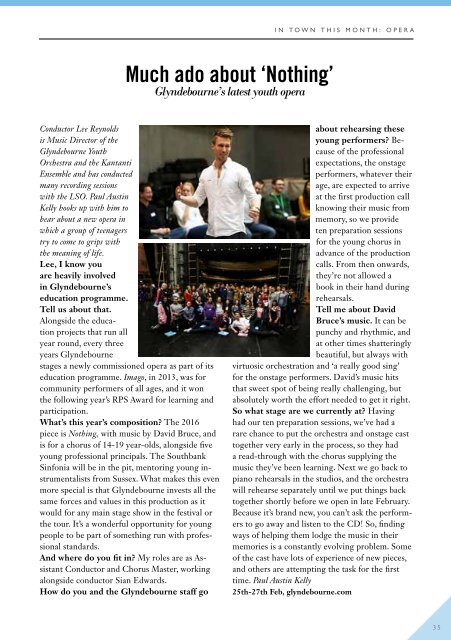Viva Lewes issue #113 February 2016
Create successful ePaper yourself
Turn your PDF publications into a flip-book with our unique Google optimized e-Paper software.
in town this month: opera<br />
Much ado about ‘Nothing’<br />
Glyndebourne’s latest youth opera<br />
Conductor Lee Reynolds<br />
is Music Director of the<br />
Glyndebourne Youth<br />
Orchestra and the Kantanti<br />
Ensemble and has conducted<br />
many recording sessions<br />
with the LSO. Paul Austin<br />
Kelly hooks up with him to<br />
hear about a new opera in<br />
which a group of teenagers<br />
try to come to grips with<br />
the meaning of life.<br />
Lee, I know you<br />
are heavily involved<br />
in Glyndebourne’s<br />
education programme.<br />
Tell us about that.<br />
Alongside the education<br />
projects that run all<br />
year round, every three<br />
years Glyndebourne<br />
stages a newly commissioned opera as part of its<br />
education programme. Imago, in 2013, was for<br />
community performers of all ages, and it won<br />
the following year’s RPS Award for learning and<br />
participation.<br />
What’s this year’s composition? The <strong>2016</strong><br />
piece is Nothing, with music by David Bruce, and<br />
is for a chorus of 14-19 year-olds, alongside five<br />
young professional principals. The Southbank<br />
Sinfonia will be in the pit, mentoring young instrumentalists<br />
from Sussex. What makes this even<br />
more special is that Glyndebourne invests all the<br />
same forces and values in this production as it<br />
would for any main stage show in the festival or<br />
the tour. It’s a wonderful opportunity for young<br />
people to be part of something run with professional<br />
standards.<br />
And where do you fit in? My roles are as Assistant<br />
Conductor and Chorus Master, working<br />
alongside conductor Sian Edwards.<br />
How do you and the Glyndebourne staff go<br />
about rehearsing these<br />
young performers? Because<br />
of the professional<br />
expectations, the onstage<br />
performers, whatever their<br />
age, are expected to arrive<br />
at the first production call<br />
knowing their music from<br />
memory, so we provide<br />
ten preparation sessions<br />
for the young chorus in<br />
advance of the production<br />
calls. From then onwards,<br />
they’re not allowed a<br />
book in their hand during<br />
rehearsals.<br />
Tell me about David<br />
Bruce’s music. It can be<br />
punchy and rhythmic, and<br />
at other times shatteringly<br />
beautiful, but always with<br />
virtuosic orchestration and ‘a really good sing’<br />
for the onstage performers. David’s music hits<br />
that sweet spot of being really challenging, but<br />
absolutely worth the effort needed to get it right.<br />
So what stage are we currently at? Having<br />
had our ten preparation sessions, we’ve had a<br />
rare chance to put the orchestra and onstage cast<br />
together very early in the process, so they had<br />
a read-through with the chorus supplying the<br />
music they’ve been learning. Next we go back to<br />
piano rehearsals in the studios, and the orchestra<br />
will rehearse separately until we put things back<br />
together shortly before we open in late <strong>February</strong>.<br />
Because it’s brand new, you can’t ask the performers<br />
to go away and listen to the CD! So, finding<br />
ways of helping them lodge the music in their<br />
memories is a constantly evolving problem. Some<br />
of the cast have lots of experience of new pieces,<br />
and others are attempting the task for the first<br />
time. Paul Austin Kelly<br />
25th-27th Feb, glyndebourne.com<br />
35


















